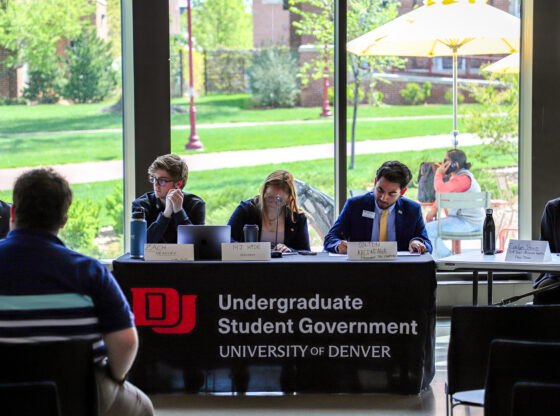With nearly a dozen amendments on the midterms ballot, voters have the opportunity to decide on new policies regarding psychedelic substances, affordable housing, and alcoholic beverage sales in grocery shops, among other issues.
Amendment D: New 23rd judicial district for Elbert, Douglas and Lincoln counties
This amendment would add seven judges currently seated in the 18th Judicial District to move into a newly created district by 2025. This new district would split the 18th in half and would become the 23rd Judicial District only including Douglas, Elbert and Lincoln counties (none of which the University of Denver resides within).
There is no organized opposition to this ballot measure. Proponents of this amendment state it would enable a seamless creation of a new judicial district, avoiding potential litigation costs.
Amendment E: Extend homestead exemption to Gold Star spouses, explained
This amendment allows gold star spouses to claim property tax exemptions up to 50 percent of the first $200,000 of their home’s evaluation. The state would not lose revenue from these tax exemptions; counties would cover such costs. There are approximately 490 gold star spouses in Colorado eligible for this exemption. According to Colorado Public Radio, in 2021, more than 266,000 seniors and approximately 9,000 veterans claimed homestead exemptions. Their average tax reductions were $587 and $617, respectively.
There are no organized committees against this proposition. Those in support of the amendment argue it pays respect for service member spouses who have lost their loved ones by providing fiscal relief for those who could suffer financial hardships as a result of loss of fixed income.
Amendment F: Changes to charitable gaming operations, explained
Colorado currently allows nonprofit organizations to operate bingo and raffles for fundraising purposes. Groups must be at least five years old with only unpaid volunteers supervising the games. This amendment would change such rules, allowing nonprofits to employ game operators while concurrently minimizing the number of years since establishment from five to three.
There are no registered opponents to this amendment. The Colorado Blue Book suggests the amendment could make it more competitive to operate a game of change. Supporters of the amendment argue the rules need to be modernized to support charity fundraising opportunities.
Proposition FF: Healthy meals for all public school students
Proposition FF would create a program to provide free access to public school meals for all K-12 students. While the state has offered to help pay for those meals, wealthier Coloradans who earn more than $300,000 in federal gross income will also contribute.
Supporters of the proposition, led by Healthy School Meals for Colorado Students coalition of parents and educators, say the new program is necessary to help eliminate childhood hunger. There is no organized opposition, although potential counterarguments include raising taxes during high inflation is unfair and that some high-income students can afford to pay and therefore do not require program benefits.
Proposition GG: Giving voters more information about proposed tax changes
This proposition would alter the requirements for how much information voters receive about proposed tax changes. When an income change is proposed, the state would create a ballot booklet which would outline the increases or decreases for individuals based on tax bracket.
Supporters of the ballot, primarily Democratic lawmakers, state this proposition is a fair push for information about financial impacts across wealth distributions. Critics of the proposition argue the ballot initiative process would become more complicated or that the state will have to pay an additional $1.24 million in printing costs.
Proposition 121: Colorado state income tax cut
This proposition would reduce state income tax rates from 4.55 percent to 4.40 percent. Colorado currently has a flat income tax rate, meaning regardless of income, all state residents are taxed the same. Short-term, residents would not save money, and long-term, about 50 percent of the savings would go to taxpayers in the top 1 percent tax bracket.
The proposition is backed by president of the libertarian Independence Institute, Jon Caldara, and Republican state Sen. Jerry Sonnenberg. Proponents, and both candidates for governor, who argue this tax reduction will encourage businesses to maintain operations in Colorado. In contrast, those opposed to the proposition include Progressive Democrats who argue the state needs more money to fund ongoing issues with infrastructure, schools, and post-pandemic business recovery. While proponents argue the time to cut the tax rate is now, opponents who are worried about a recession fear cutting the tax rate now will mean less state budget to work with later.
Proposition 122: Access to natural psychedelic substances
This ballot measure would decriminalize psilocybin and psilocin, hallucinogenic compounds found in certain strains of mushrooms, for those over 21 under the Natural Medicine Health Act. Proposition 122 creates a legal access program supervised by a trained facilitator, rather than over-the-counter access to these substances. Other hallucinogens such as DMT, ibogaine and mescaline would be available in 2026.
Proponents argue this new program would provide different options to existing therapies, combatting Colorado’s limited mental health care access. Organizer Kevin Matthews also points out the proposition will regulate existing use of psychedelics, making it safer for consumers. The city of Denver partially agreed to decriminalize psilocybin in 2019. An oversight panel for the measure concluded the decriminalization of hallucinogens did not pose a significant public safety issue. The FDA also designated psilocybin a ‘breakthrough therapy’ but has not approved its use for any purposes.
The primary opponents of this measure includes the issue group “Protect Colorado’s Kids” who argue decriminalization will lead to greater access to psychedelics for youth. While those under 21 would not be able to access these hallucinogens, consumers over 21 with access could provide the substances, which parents argue is a dangerous, unregulated market.
Proposition 123: Dedicate tax revenue to affordable housing
This ballot measure would dedicate millions annually to an affordable housing development program. The state budget would designate nearly 2 percent of income tax revenues of $300 million in the upcoming fiscal year for affordable housing development.
Proponents, such as Make Colorado Affordable, largely endorse the proposition with financial backing from Habitat for Humanity, the Urban Land Conservancy, the League of Women Voters, and both state Democratic and local-level Republican lawmakers. The conservative group Advance Colorado Action is strongly opposed to the measure, stating it is not an efficient diversion of money from the state budget.
Proposition 124: Increasing the number of locations a liquor store chain can operate
Proposition 124 would allow chain liquor stores to increase the number of outlets they own and operate. Currently, stores can only manage three storefronts. This proposition would allow stores to operate up to eight locations, eliminating the cap by 2037.
The primary proponent of this change is Total Wine which is a national liquor store. With 240 locations across 27 states, Total Wine currently has three in Colorado. Similar to propositions 125 and 126, nearly 1600 locally-owned liquor stores are opposed to this measure arguing larger chains would dominate the liquor market.
Proposition 125: Allowing grocery and convenience stores to sell wine
This proposition would allow supermarkets to sell both wine and beer. Under current law, supermarkets are only able to sell beer.
Similar to Proposition 126, proponents of this proposition include large supermarkets and tech companies, arguing it would be more convenient for consumers. Locally-owned liquor stores largely oppose this proposition, arguing they would lose significant business thereby impacting their profit margins.
Proposition 126: Third-party delivery of alcoholic beverages
This proposition would allow third-party services, such as Doordash, to deliver alcoholic products, contrasting current law which only allows liquor stores and supermarkets to deliver these products using their own employees. In addition, this proposition would make permanent Governor Polis’ bill which extended to-go restaurant alcohol sales. Drivers would have to be 21 years or older and would have to pass a certification program.
Supermarket chains and delivery app companies are largely in support of this proposition, stating it will offer consumer convenience and safety, potentially limiting the danger of intoxicated people driving to liquor stores. Those against the proposal include nearly 1600 locally-owned liquor stores whose owners are approximately 50 percent women and two-third speak English as a second language. Many of these businesses argue they will lose a significant portion of their profits either by not partaking in the delivery option or by covering the delivery service fee.











